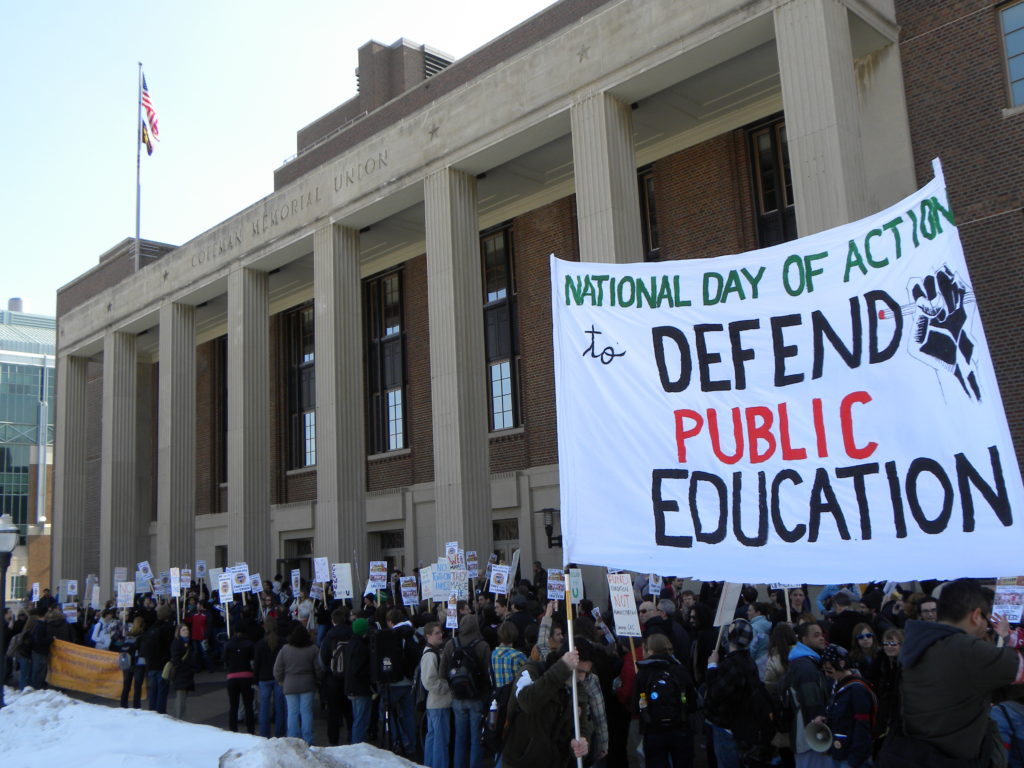
By Jonah Hinebaugh
The number of independently run schools, namely charter schools, has continually risen over the years while public schools suffer as budgets are cut more and more.
In December, a vote from the Orleans Parish School Board has positioned New Orleans to become one of the nation’s first major cities with an all-charter school district.
It’s a complex issue and hard to capture in a small op-ed, but it’s important to note the further muddying of the rights which should be provided to citizens, even in a country where democracy is threatened.
The education system is like a microcosm of the continual commodification of resources that should be available to every citizen – it should go without saying that it further separates the proletariat from the bourgeois ruling class that dominates everything, thus contributing to a growing, and already large, poverty cycle.
Betsy DeVos, the U.S. secretary of education, said her mission was to expand alternatives to traditional public schools. It seems she’s given up on trying to maintain and fix public schools that desperately need it to allow all children the chance to receive a proper education.
It’s baffling that schools and programs that habitually cut into funds for public schools, by running under the guise of nonprofit schools, can have staunch supporters – supporters like wealthy individuals, including Netflix founder Reed Hastings, former New York City Mayor Michael Bloomberg and Bill Gates – who all contribute heavily to the expansion of charter schools through private donations.
Advocates argue that it creates a free market environment by pitting schools against each other to provide the best education so more students attend.
What isn’t considered is the possibility of these schools to not “teach,” but hammer cheap tricks and memorization into student’s minds so they know how to pass exams.
It isn’t education or learning; it’s finding ways to mimic that idea.
The benchmarks that these schools try to achieve through those tactics do not accomplish anything beside proving that a public, universal education system is ideal in finding the best solutions for students to prosper as opposed to independent or private education.
Financial issues include for-profit companies and contractors involved even in charter schools touted as nonprofit.
Charter schools are typically run by nonprofit charter management organizations, allowing them to cut into funds from the state and federal levels.
According to the Education Commission of the States, Florida uses “federal, state, local, discretionary lottery and discretionary millage levy funds” for charters that are allocated according to the same formula as funds allocated to other public schools.
It makes sense they are treated similar to public schools, until the unsurprising caveat in which these organizations can contract for-profit companies to manage some or all of the school, including employment, school policies and curricula.
Public funding can also be diverted through school voucher programs, where education tax dollars instead go toward subsidizing tuition for private schools.
Why should federal and state funds be funneled into charter and private schools that are able to pick and choose which students are allowed to enter? It creates the possibility of exclusionary policies.
It leaves students across the U.S. who can’t get into — or can’t afford to attend — private and charter schools predisposed to not receiving an up-to-par education because of the deteriorating status of public schools.
I fail to see what is gained from selective admissions susceptible to something like neo-segregation, tearing down all that was gained through efforts like Brown v. Board of Education. This can be sustained further by nepotism, which essentially grandfathers in students.
It doesn’t only affect students, though.
According to a LA Times article, these schools are exempt from providing union contracts. This is, again, another important issue that needs to be addressed, because unions are fundamental in protecting educators from exploitation and giving them leverage to demand livable wages.
Thousands of educators, both from charter and public schools, in the LA Unified School District, the nation’s second-largest school system, have aggressively protested – fighting against the charter schools they believe are draining public funds.
Between exclusionary practices, the siphoning of public funds, and fighting against educator representation, it’s incredibly absurd to justify charter schools.
These schools, in particular, actively work in undermining democracy — something the U.S. shoves down our throats constantly.
Advocates can’t spout about how great and free our country is when they turn around and donate or to support these supposed “better options” to public schools instead of trying to help decommodify something vital – something that is a pillar for success of all.
It seems we’ve lost New Orleans to charter schools, but we can only hope the educators in LA continue to fight against a devil in the form of privatized education.



